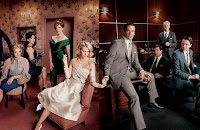The BFI Southbank is currently running a lecture series on screenwriting. Writers appearing in the series include: Sir David Hare (
The Hours,
The Reader), Simon Beaufoy (
The Full Monty,
Slumdog Millionaire), Peter Morgan (
Frost/ Nixon,
The Queen,
The Special Relationship), Aline Brosh McKenna (
The Devil Wears Prada,
27 Dresses) and Ronald Harwood (
The Pianist,
The Diving Bell and The Butterfly). Although I don’t have any particular interest in getting into film writing I am interested in all aspects of writing for the screen. The lecture I opted for was perhaps the most relevant to me, as it was about the art of writing rather than about films generally. Elliot Grove is the founder of the
Raindance Film Festival, started in 2003 to support the British Independent film industry and they now provide training for writers and film-makers (which, as with all these courses, is extortionately expensive at £290 for two days).
Grove seems like a fascinating man, growing up in a rural Amish community he describes his first experience seeing a film and how he got into films via art school and set design. When it came to setting up Raindance he said he realised one thing: that Brits can be snobby about something new and unbranded. They like to know what they’re going to get. So to his first film few film festivals the audiences were mainly American or from elsewhere in Europe. However over the next few years it grew, and now is a huge event in the film lovers calendar. This got me to thinking – I don’t have to sit and whine, I have to set something up myself! It would be great to have some sort of support or networking system for young people who want to get into TV who are under 30 with limited experience. It’s all well and good to get advice from established professionals now, but let’s be honest – the nature of the beast is very different from ten years ago.
The rest of Grove’s talk was anecdotes from his work, and a good chunk of advice:
-Learn how to format correctly and uniformly.
-READ scripts. Look for patterns in the scripts, both good and bad. Most bad scripts make the same mistakes so make sure you recognise them in others to avoid making them yourself.
-The industry is surrounded in mystique. Try to break that down.
They don’t want to meet new talent. They say they do, but they don’t. They’re worried you’ll be good and steal their cheese.
-The reasons why people don’t write are i) Lack of confidence ii) Self-destruction iii) Procrastination.
-The best way to write is to write a little every day and to keep that time sacred. Don’t let other tasks get in the way.
-The biggest thing is to entertain; if you’re not doing that you’re in the wrong business.
-The four basic tools for story-telling are: the characters, what they do, what they say, and the setting. Weave them together so the seams don’t show.
-Fim-making is about commerce. A writer has to inspire everyone else making the film, and once it’s written let it go.
-Don’t put reality into your script as we see it every day. Shape it into a story.
-People are voyeurs, put something on the screen that they would want to watch.
-Writing is a very minimal art form, so select your words carefully for maximum impact. Think about the impact of
walk versus
rushes,
dashes,
limps etc.
-But don’t overwrite. Every time you write something down re-read and ask yourself: is there a quicker way to say that?
-You aren’t writing a screenplay for the audience. You write it for the reader (who is invariably white, male, middle-aged, middle class). The role of a film-maker is to illicit emotion in an audience but the role of a writer is to illicit emotion in a reader.
-You will stumble on misfortune, don’t take it personally. Ask yourself if every hit film good? And therefore is every good film a hit?
All in all very useful and, more importantly at the moment, very inspiring. I’m off to adapt Senses as a stage play and see if I can have any luck getting that produced.


